On 22 and 23 March 20201 Forum for Human Rights in cooperation with the International Commission of Jurists and the Judicial Academy of the Czech Republic has organized a judicial training for Czech judges and judicial assistants on Selected discourses of asylum and migration law from the international and national perspective. The seminar was attended also by lawyers from the Office of the Public Defender of Rights of the Czech Republic as well as asylum judges from Slovakia. The seminar was a part of the FAIR PLUS project, co-financed by the European Union. You can review the program of the seminar here.
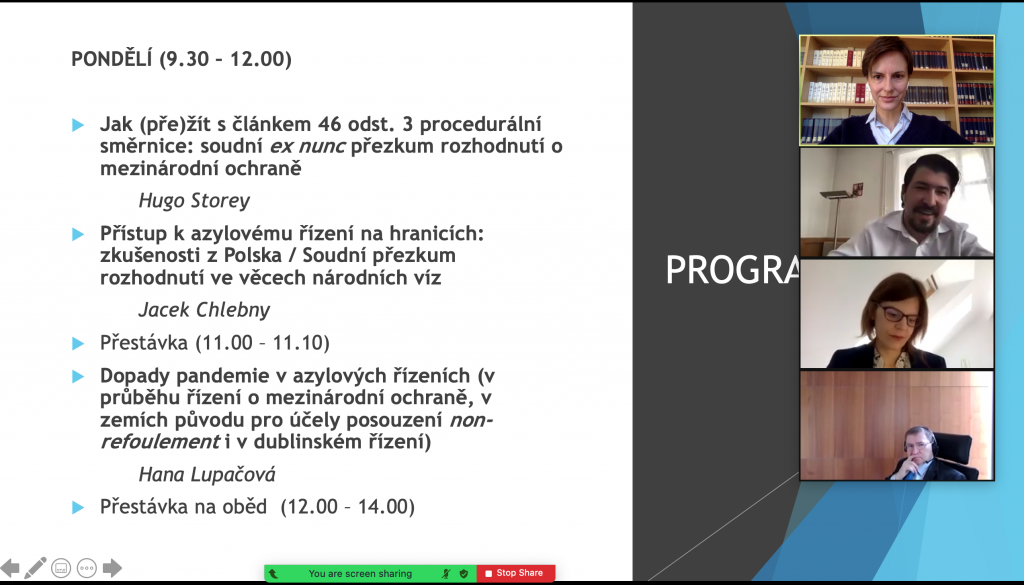
The seminar addressed relevant questions of the protection of human rights in asylum and other related proceedings in the Czech Republic and other European countries. The speakers included highly experienced European judges and Czech legal experts. The seminar which was held online due to epidemic restrictions was viewed by over hundred participants.
In the first session, Hugo Storey, a recently retired judge of the Upper Tribunal (UK) and the former Chairperson of the European Chapter of the IARMJ, spoke about Article 46 of the Asylum Procedures Directive (APD) which covers the need for ex-nunc effective remedy in decisions about asylum. Lively discussion unfolded, especially related to the specific obligations of higher administrative courts related to examinations of facts and law when reviewing decisions about access to international protection. Especially the question whether the Czech rules of procedures are legislatively adjusted to the approach of Article 46.3 APD, which requires that an “effective remedy provides for a full and ex nunc examination of both facts and points of law, including, where applicable, an examination of the international protection needs.”

The Vice-President of the Polish Supreme Administrative Court and Professor at the University of Łódź Jacek Chlebny shared his experience with filing preliminary references with the Court of Justice of the European Union (CJEU) in cases regarding judicial review of natinal visa cases. He also spoke about the European Court for Human Rights (ECtHR) case M.K. and Others v Poland, which concerned the State practice of systematic push back of asylum seekers at the borders between Poland and Belarus. The judge stressed the need for individual assessment in all such cases. The question of the lack of suspensive effect of the refusals of entry was further discussed among participants.
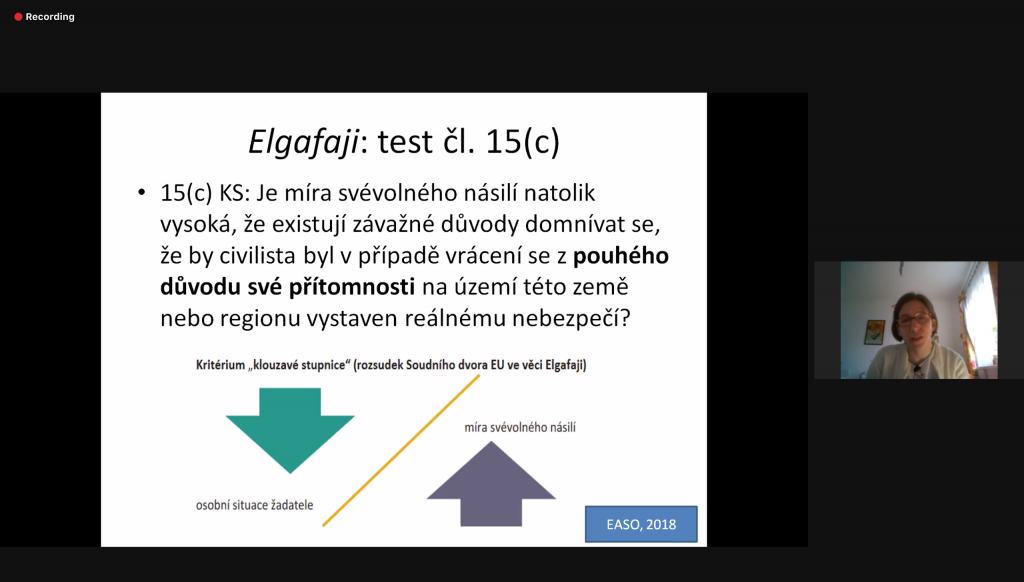
Assistant at the Czech Constitutional Court Hana Lupačová discussed the impact of the Covid-19 pandemic on asylum and other related procedures. The participants discussed the impact of the pandemics on the rights of migrants and refugees in the Czech Republic and other EU countries.
The event further covered the issue of the right to family life of migrants. Nuala Mole, senior lawyer from the AIRE Center, discussed the right to private and family life especially in the context of termination of stay – in cases of expulsion and refusal to renew residence permits or refusal to regularise. She focused the relationship between the European Convention on Human rights and the Convention on the Rights of the Child in the context of the right to family life, especially the “best interest of the child” principle and the need for the authorities to demonstrate that the best interests of the child have been taken into consideration when children may be affected by the decision. Jan Kratochvíl, a judge of the Prague Municipal Court, commented on this issue from the national jurisprudence perspective.
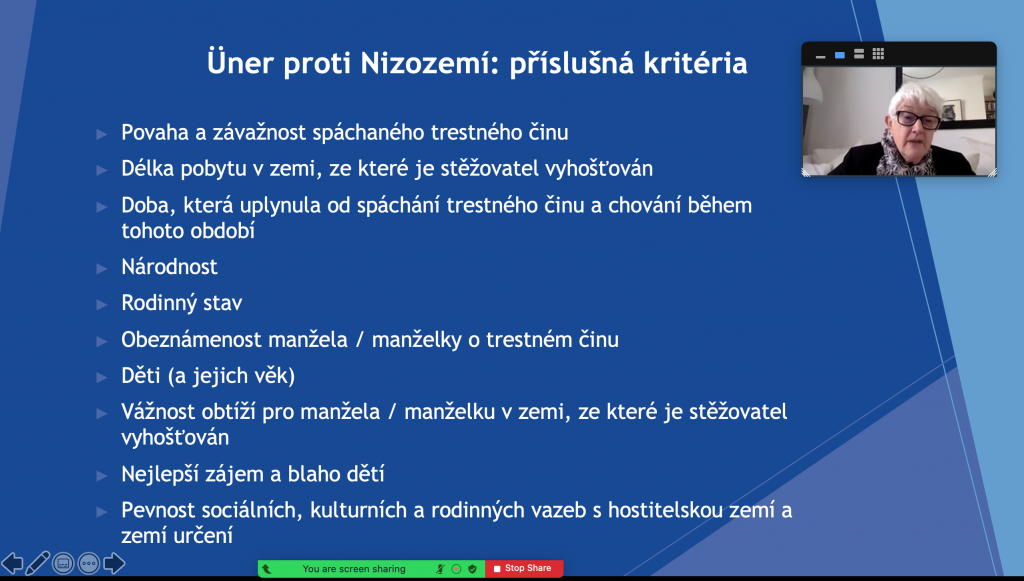
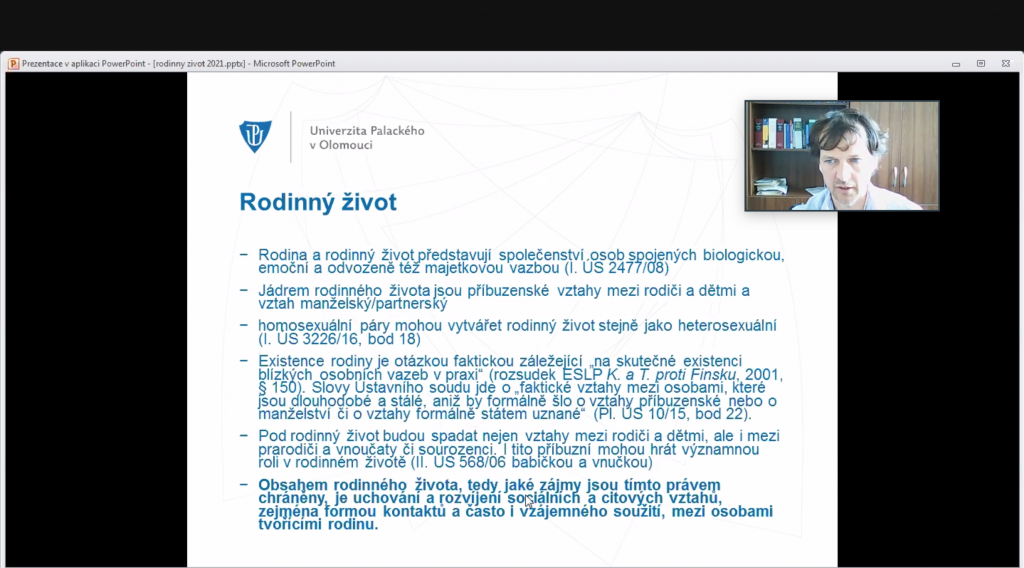
During the second day of the seminar Prof. Bostjan Zalar, Senior High Court Judge of the Administrative Court of Slovenia and President of the European Chapter of the IARMJ, discussed he role of the courts in the judicial review of immigration detention from international and EU law perspective. Prof. Zalar offered a historical perspective on the issue of immigration detention from Magna Carta to ELI’s Checklists for Judges criteria for lawfulness of immigration detention. He also covered differences in the CJEU and ECtHR case-law, focusin on the looking at the concept of “choice” in the transit zone on borders and at the airports.
John Stanley, Deputy Chairperson of the International Protection Appeals Tribunal (Ireland), explained the details about the Irish case-law related to the definitions and identification of vulnerable persons. Alexandra Dubová, a lawyer from Forum for Human Rights, analysed the legal regulation of vulnerable persons in EU and Czech law and pointed to the problematic question of identification and protection of vulnerable persons in the Czech Republic. A discussion followed regarding the actual obligations of judges to identify vulnerable persons in asylum and related proceedings. Marie Lukasová from the Ombudspersons office and the CPT member addressed identification of victims of torture or other inhuman and degrading treatment in the asylum procedures.
Finally, doc. Helena Tužinská, an anthropologist from Bratislava University, spoke about communication with migrants: an ethnography of interpretation in the asylum judicial proceedings. She presented her recent research into judicial decisions in immigration matters, and the concept that translation among two actors might not be enough, as concepts and terms might mean different things in different cultural settings. In her discourse, she suggested that judges, or administrative officers, are a social group themselves having a certain reference framework, understanding and a way of thinking, and expect others including asylum seekers and other foreigners to think in the same way. The interpretation needed is not only linguistic, but a broader transmission of concepts or cultural experiences. Credibility, substantiation and impartiality of interpreters was also discussed by Prof. Tužínská, questioning the understanding of a judge, what honesty means, or the ability of police reports to capture the experience of an asylum seeker, for instance.
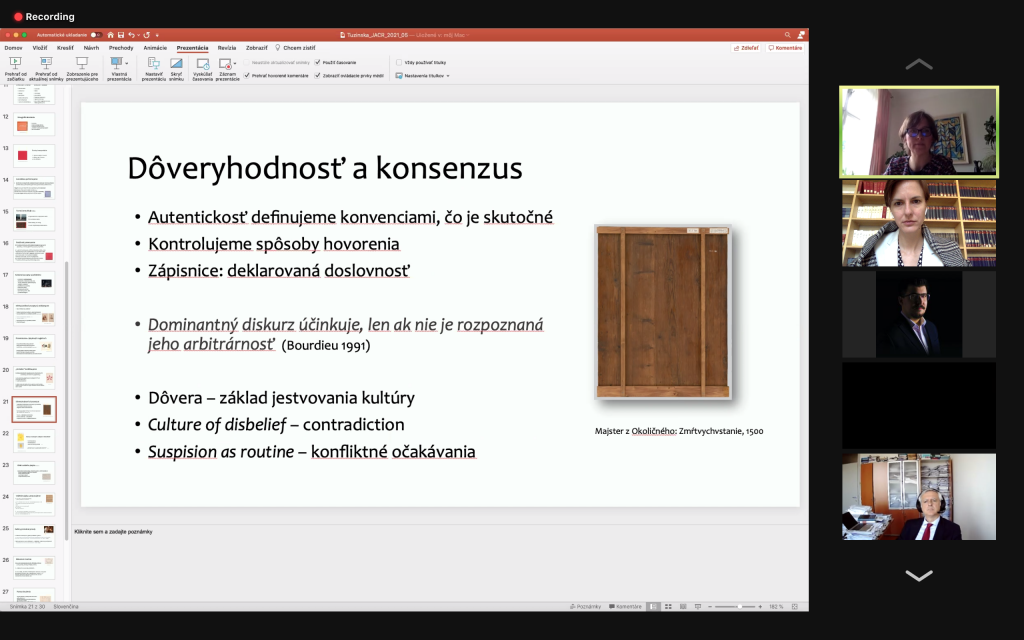
This seminar was conducted as part of the international project FAIR PLUS: Fostering Access To Immigrants’ Rights Plus. The project is funded by the European Union’s Justice Programme (2014-2020).

